Read more
David Williams rebelled against his puritanical background and became one of the most significant Welsh thinkers of the eighteenth century. His reputation has been that of an intriguing and fascinating maverick with a powerful independent streak. He is variously known for being the founder of the first deist chapel in Europe holding public worship, as a daring educationalist inspired by Rousseau, as a political theorist who championed a new concept of political liberty - perhaps his strongest claim to originality - or more commonly, as the founder of the Royal Literary Fund which was a benevolent fund for writers and worked to improve their status. Only this latter role has won Williams general praise, while his hostility to Christianity and his sympathy for French revolutionary ideas repelled many others. These individual causes, however, all reflect a particular view of the world and it is this and Williams's contribution to the history of ideas that the book attempts to elucidate. Williams considered a form of secular public worship based on natural religion to be a fundamental means of binding a community together on the basis of universal moral principles. He also believed education prepared the young for membership in such a community. The establishment of such a community required an awareness of the role of literary and philosophical genius. His concept of political liberty required an organisational structure founded on powerful local units for which he found a parallel in pre-Norman England, as well as the commitment to absolute intellectual liberty. Such ideas made him an enemy of superstition and authoritarian structures. Indeed, he held political liberty to be more important than civil liberty, leading him to accept restrictions on freedom of movement and association when they threatened his concept of community. The book exploits new manuscript, newspaper and bibliographical material unavailable to earlier writers. Among the most significant are Williams's letters to Brissot which trace the development of his views on France during the Revolution.
Summary
His concept of political liberty required an organisational structure founded on powerful local units for which he found a parallel in pre-Norman England, as well as the commitment to absolute intellectual liberty.

